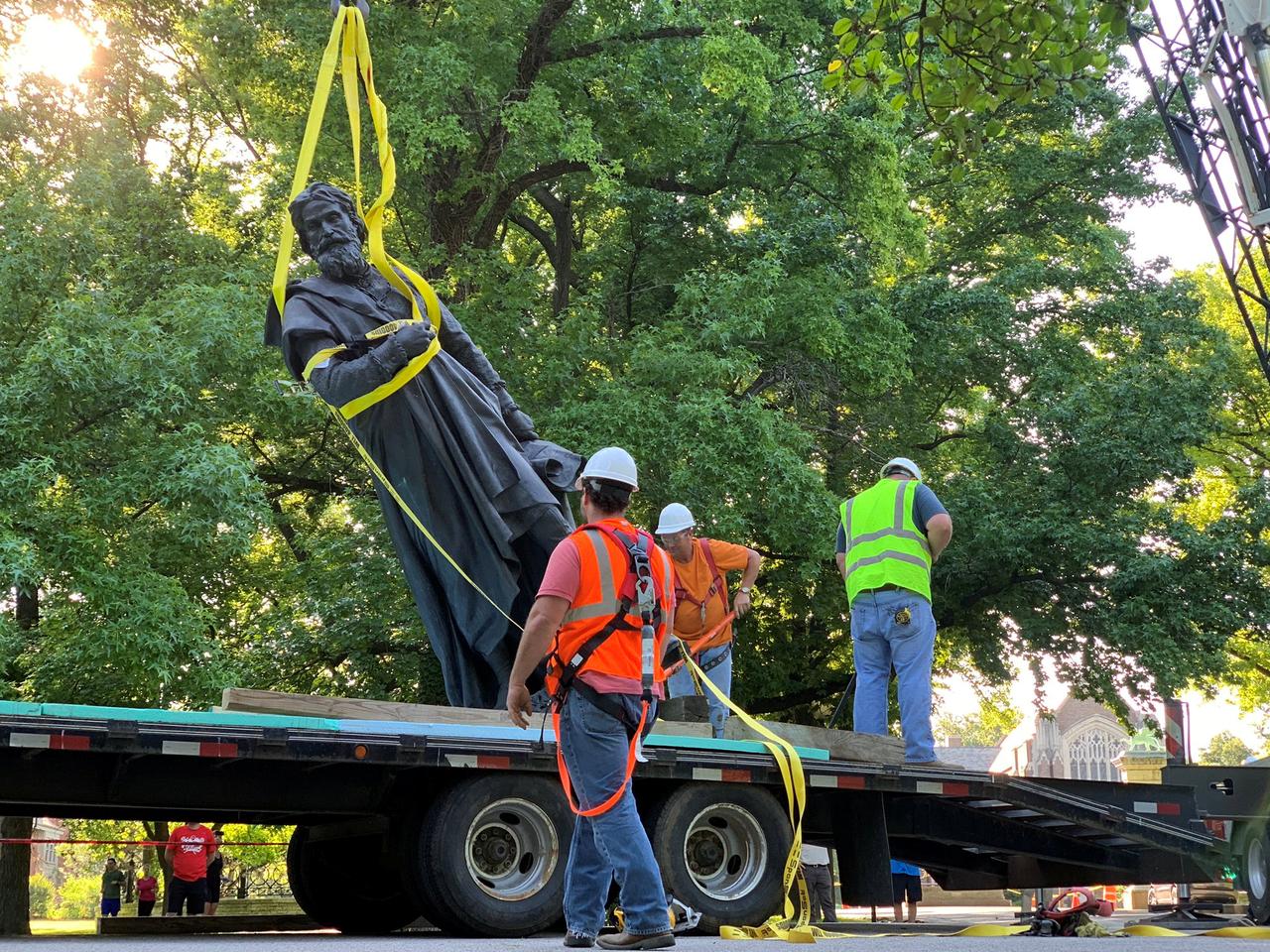Revision of history could help heal societal divisions
https://arab.news/ve9nn

Over the past few weeks, statues of several controversial historical figures have been pulled down in many parts of the world. Many of these incidents have occurred amid disputes between those wanting to topple the statues and those who saw them as key parts of the history of their country and the protesters’ actions as nothing but an attempt to destroy or rewrite history.
The protests have perhaps been most controversial in the US, the world’s lone superpower, and Belgium, the tiny minnow from Europe that punched far above its weight around the turn of the 20th century. In Belgium, the figure in question is King Leopold II, who ruled from 1865 to 1909 and is “credited” with having conquered a huge swath of Central Africa in 1885, especially what is today the Democratic Republic of the Congo and its neighbor, Congo-Brazzaville. Leopold ran the bloodiest colony in Africa and is said to have been responsible for as many as 10 million deaths on the continent.
In the US, the targeted statues ranged from Christopher Columbus to numerous leaders of the Confederate states, who were in favor of slavery and were fervent believers in racial superiority. Indeed, the history of Confederate America is one that polarizes opinions even today, more than 150 years after its defeat in the US Civil War. For the protesters and anti-slavery activists, statues of Confederate leaders are an insult to the African-Americans whose ancestors suffered greatly at the hands of slave traders and their likeminded politicians.
There have been hundreds of such divisive figures all over the world throughout history. Because few leaders or historical figures have been one-dimensional, the actions of the same person can be repulsive to some, while others laud them. Take Leopold II. Despite being a murderous despot in large parts of Central Africa, in Belgium he was, and even today is, seen by most as having taken the Belgian Empire to its zenith. He earned the tiny country a place at the table of the European powers of the epoch.
Hence, for most Belgians or at least its various governments, it was fine to have monuments in his honor all over the country, even if he had presided over one of the worst genocides in the history of the world. The same can be said of various American leaders and generals who fought in the civil war on the Confederate side, despite the baggage of slavery, racism and white supremacy that comes with them.
Even today, for many Americans, these personalities are heroes from their history and they remain proud of them and their achievements. That’s why there have been protests and clashes about the removal of these statues or the renaming of government buildings, colleges or other institutions.
Another historical figure whose statues have been targeted is Columbus, the Italian explorer who “discovered” the Americas. His voyages brought unprecedented riches to the Spanish monarchs he served, as they quickly colonized the rich territories of the continent, but they simultaneously destroyed entire native civilizations that had thousands of years of history. For centuries, schoolchildren have been taught only that Columbus and his Portuguese rival Vasco da Gama were great explorers who contributed immensely to human knowledge.
Conflicts over these personalities frequently occur partly because schools in most countries teach history from their own perspective and either totally overlook or gloss over the immense damage done to mankind by these “heroes.” Most children are not told how these figures ended up destroying entire societies and creating problems that would not just outlive them, but would continue to divide the entire world for hundreds of years after their deaths.
It is the absence of a well-rounded education and the presentation of history in its entirety, rather than just from the winners’ perspective, that has ensured vicious divisions over indefensible historical actions and events remain in our society today. The lack of a sensitizing education is also partly responsible for the widespread racism that has always been intertwined with slavery, at least in the US and Europe.
However, the reform of education and “rectification” of history looks extremely difficult to achieve, if not impossible, at a time when the US appears to have drifted so far to the right and when the Republicans and Democrats don’t seem to even agree on the time of day. It would be a miracle if history books in the South were modified to reflect the bitter truths about the past and the role played by the Confederate “heroes” in creating racial fissures in society.
The reform of education and ‘rectification’ of history looks extremely difficult to achieve.
Ranvir S. Nayar
Revising history is perhaps easier said than done, as it requires moral courage for a leader to stand up and say that his country has been in the wrong and has done inhumane things. This is the reason why, even decades after the end of colonization in most parts of the world, the former colonizers and slavers are yet to recognize their errors and apologize, or even pay reparations for those acts. Thus, even though Europe has been better placed than the US to revisit its history and rectify its schoolbooks regarding the damage its colonization and slavery caused the world, it has only managed to take baby steps. Perhaps the right way to resolve this matter would be to involve historians and scholars from the countries and societies that suffered at the hands of the Europeans in the redrafting of history books for European children. Perhaps only then will the issue receive the sensitivity and openness required to put an end to the debate.
- Ranvir S. Nayar is the editor of Media India Group, a global platform based in Europe and India that encompasses publishing, communication and consultation services.








































